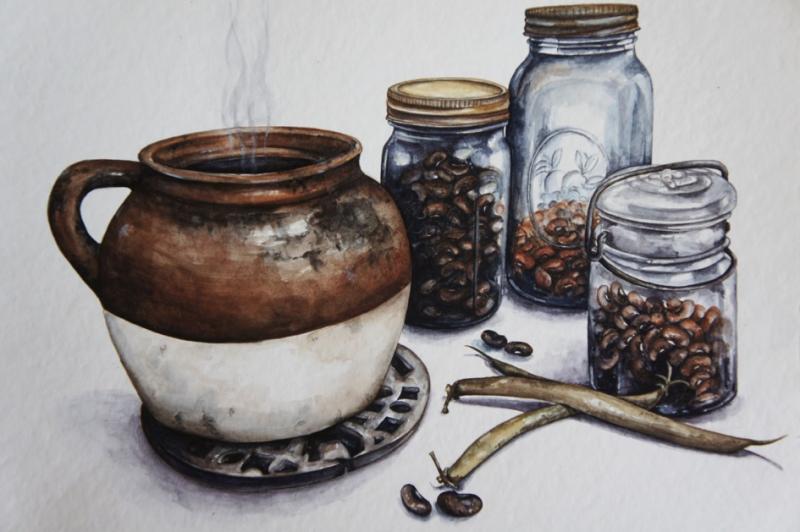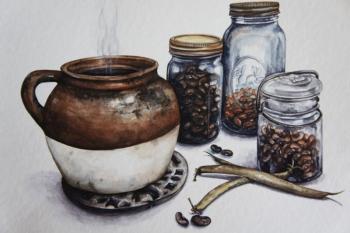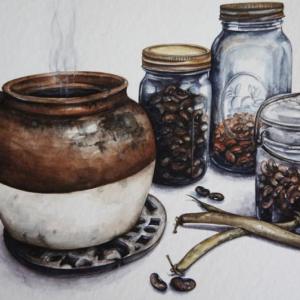This Week in Lincolnville: Found in the Collection
Part of the fun in managing a historical society is the discovery. Picture a room lined with shelves, the shelves stacked with boxes, long wooden cabinets filled with drawers, and an attic with more of the same. Each of the boxes, each of the drawers, the vertical slots built into a cupboard, the horizontal map case, the plastic bins under the desk, the dozens of three-ring binders: they all hold papers and journals, photos and letters, more stuff than a little town could possibly generate.
A 250+ year old town with a population that’s fluctuated from a low of about 298 (1790) to a high of 2,150 (1850) back down to 811 (1920) and today, to 2,312. A town that began as a rocky, swampy, forested 39 square miles, four miles of it on the shore of Penobscot Bay, much of it uninhabitable marsh or rocky heights, where the only economy was its trees. And its access to the sea. And the thick and long deposit of limestone that ran through it. And its abundant rainfall, coastal warm summers.
Long before it was a town this was summer home to the Penobscots, a Wabanaki tribe, the place to fill their larders with clams and oysters, dried fish and blueberries. Though the place began to be settled by people who came up from Massachusetts (the District of Maine was still considered part of that state until 1820) in the late 1700s, there are only very few references to encounters between the two peoples here.
The newcomers had left the part of New England where a couple of hundred years of cultivation had worn out much of the farmland. Where large families meant their tracts of land got divided between the heirs into smaller and smaller farms, until finally the younger ones left and tried Maine. Or after the Revolution came seeking what they thought would be their due: a piece of land to call their own.
And then they generated reams and reams of paper – account books, diaries, letters, receipts, scrapbooks, photos – the heart of our LHS collection. A collection that’s still full of surprises.
Here’s one I re-discovered the other day while going through a shelf reserved for local artists and authors. A thin portfolio, it had apparently been included with Kerry Hardy’s Notes on a Lost Flute: A Field Guide to the Wabanaki and a giant volume of Neil Welliver paintings, Liz Hand’s novels, Tony Oppersdorff’s lovely Labrador book, several others on painter Alex Katz, and Scott Dickerson’s book on the Ducktrap Stream.
It was a prose poem by Joyce Wiley Webb. I know nothing about her except her middle name places her here in town, most likely part of the Wiley family of Wileytown (at the intersection of Moody Mountain and Hope roads). If you’ve heard of her, please let me know! Along with her name and Wisconsin address the label on the cover says “c. 1968”. It was too long to include here, but you can read the whole poem on the LHS site
CALENDAR
MONDAY, Oct. 4
LCS Lynx soccer, 3:45 p.m., HES (Hope Elementary School)
School Committee, 6 p.m., LCS
TUESDAY, Oct. 5
Library open, 3-6 p.m., 208 Main Street
Lakes and Ponds Committee, 4 p.m., Breezemere Park
WEDNESDAY, Oct. 6
Schoolhouse Museum, 1-4 p.m., 33 Beach Road
Library open, 2-5 p.m., 208 Main Street
THURSDAY, Oct. 7
Cross-country meet, 4 p.m.. Searsport
Recreation Committee, 5:30 p.m., TBD
FRIDAY, OCt. 8
Library open, 9 a.m.-noon, 208 Main Street
Schoolhouse Museum, 1-4 p.m., 33 Beach Road
SATURDAY, Oct. 9
Library open, 9 a.m.-noon, 208 Main Street
EVERY WEEK
AA meetings, Tuesdays & Fridays at noon, Community Building
Lincolnville Community Library, For information call 706-3896.
Schoolhouse Museum open M-W-F or by appointment, 505-5101 or 789-5987
Bayshore Baptist Church, Sunday School for all ages, 9:30 a.m., Worship Service at 11 a.m., Atlantic Highway
United Christian Church, Worship Service 9:30 a.m. outdoors or via Zoom
Return to Lincolnville
March 1935
The fog was slow to drown the mainland hills,
The hills like islands in the slowly circling mist.
The fog from the Gulf of Maine obscured the coast
And moved inland to shroud the winding roads.
While driving up Route One Ben Colby heard
The Rockland fog horn, curbed his speed and drove
Toward home, a home no longer his, but he knew
He would be welcome. “Return of the Native” Ben recalled,
“I ought to quit. Just drive this crate off the road
And die.” But Ben still drove with watchful care,
He drove toward home, the town of Lincolnville.
Ellen Colby leaned to lift
A pot of beans from the oven, moved the pan
Of ham away from the front of the stove and threw
A sweater around her shoulders. Flashing her light
She sped through the buttery and woodshed to the barn,
In the tie-up White Paws waited for squirts of milk
From the Ayrshire Charlie was seated beside. The cat
Was licking his whiskers. “Supper’s ready. Stop
Your nonsense with that ridiculous cat. He’s worse
Than a kitten,” Ellen complained. “All done. Old cat
Was hungry,” Charlie protested. “Better feed
Him more scraps.” “He eats more now than the dog. Come on.”
The coffee perked as Ellen served up the meal
And set the blocks of soapstone to heat. The cat
Slipped under the stove beside the sleeping Wolf
Who snuffed and whimpered, dreaming summer dreams.
The bowls of upright spoons in the pressed glass holder
Reflected yellow lamplight as Ellen set
The ham, the pot of beans and loaf of brownbread
On the blue checked oilcloth faded by frequent scrubbing.
“Mother called,” said Ellen. “Pa will have
Loren at the ferry slip at noon tomorrow.”
“Your father doesn’t have to tote that boy
All over Penobscot Bay just because he wants
To see an Islesboro-Camden basketball game.”
“If Loren took the notion he wanted to go
To Alaska you know that Pa would take
Him there.” “I guess he would,” Charlie agreed.
After supper he pulled the rocker near
The table and read the Pathfinder. Ellen washed
The dishes, strained the milk and mended socks.
The clock had just struck nine when Charlie yawned.
Outside a whining Chevrolet stopped
In the dooryard. Charlie jerked to his feet and Ellen
Sat motionless. Sam drove a Chevrolet,
But Sam was dead from missing Stevens’ Turn.
Then someone knocked at the door and Charlie opened
It wide. His younger brother, Ben, stood there
Not exhuberant, self-confident Ben, but alive.
“For Pete’s sake, look who’s here, Ellen. Come
In Benny. This is no night to be out
Driving around the country.”
“You drove from Portland tonight?” she asked. “In all
That fog?” He nodded. “Plenty thick from Rockland.”
He took off his coat, and slumped into a chair.
“You need a drink,” said Chairlie. “I’ll see if there’s
A bottle left in Sam’s room.” Ben looked
At Ellen. “Sorry I couldn’t get here last week
For the funeral. I just couldn’t get away
About then.” “Charlie expected you to come.”
He shrugged his shoulders. “I couldn’t get away.”
She did not answer as Charlie came downstairs.
“Guess he forgot this one.” He poured a drink
For Ben and one for himself. “What happened, Ben?”
“I’ve lost my job. The store went broke. No jobs
In Portland. I need a place to stay.” He drank.
“You lost one shiftless brother, you gain another.”
“Don’t talk like that,” said Charlie. “This is home.
You’re welcome here. You’re not the only one
Who’s lost his job. Mable Chapman’s back.
Of course she can keep busy at the store if she’s
A mind to. Cal’s not well, got back trouble.”
“Mabel good looking as ever?” Ben asked casually.
“It’s hard to tell,” sniffed Ellen. “With all
The paint she wears.” “Go take a look, Ben,”
Suggested Charlie. “You used to be good friends.”
“Mabel had a lot of friends besides me.”
“Among the men,” inserted Ellen. “It was
A good day for Lincolnville when that woman left.
I suppose none of her fancy boyfriends have any
Money now so she had to come home.
I’ll fix your bed, Ben. Goodnight.”
Charlie winked at Ben and chuckled as he
Poured another drink. “Woman are cats.”
After putting wood in the stove he opened the draft.
“This damned depression gets worse,” said Ben,
“I worked like a Digger Indian and then to lose
It all. It wasn’t fair. It wasn’t fair,
I tell you.” He banged his fist on the table.
“You’re young. You can start over again.
You don’t have a wife and kids to worry about.”
“Women! I’ll never forgive that Portland bitch
Who made a fool of me. She gave me the gate
When I lost my job.” “They all aren’t that way.
You got a home here. We have enough
To eat. I shot a deer last fall and butchered
A hog in January. Ellen canned a lot
Of fruit and vegetables last year.
Something will come along.” “I hate to move
In but I had no other place to go.”
“This is home. We Colbys have seen a lot worse –
See here, Ben, have you forgotten how long
The Colbys have lived in Lincolnville? Ethan
Came here in seventeen seventy-seven along
With Millers, Youngs and Calderwoods. That was
Only seven years from when Nathan Knight
The first settler came from Castine to Duck Trap.
There wasn’t anything around here but woods
When Ethan laid this foundation in eighteen hundred.
He built this house and cleared the land alone.
His sons and grandsons made a living here.
They cut timber, burned limestone, built ships
And anything else to make an honest living.
Some say this town is dead. No way to make
A living. Now it seems some other places
Aren’t exactly paved with gold either. There’s been
Too many leave here, up and coming chaps
Like you.” “Now they’re down and out like me.”
“Maybe you should have stayed here. The town
Could use more Colbys.” “More like Brother Sam?”
“There’s a no good drunk in every family and he
Was it in ours; the exception that proves the rule.”
“Maybe so” Ben yawned. “You may be right.”
“You’re tired. Let’s go to bed. You take the lamp.”
Charlie closed the draft and found the door.
Under the stove the dog and cat still slept,
Forgotten by the man, they could sleep inside the house.
Ben set the glasses by the sink, took the lamp
And climbed the stairs to the room he used to share
With Sam. He undressed quickly. In bed he pulled
The crazy quilt around his neck. The soapstone
Wrapped in towels had warmed the sheet-blankets.
He sighed, yawned and slept without dreaming.
Although the northern spring was weeks away
Outside the snow was soft from warming fog,
The maple sap was rising and across the lake
Came gun shot sounds of cracking ice.
Finish reading Joyce Wiley Webb’s prose poem here.
More About the LHS
Just this morning we were thrilled to learn that the Beach Schoolhouse Restoration Project received a grant of nearly $29,000 (sorry I don’t have the exact amount) from the wonderful Davis Foundation! This is the full amount we requested to fix several of the building’s needs. The Davis Foundation has also been supportive of the Lincolnville Library in the past. This, along with a grant from the Water Wheel Foundation, and the many generous donations from the community and LHS members will enable us to transform our old schoolhouse building into a handsome addition to the town’s historic structures.
School
Another piece of news is that the Union 69’s superintendent and staff will be moving the school district’s office (Appleton, Hope and Lincolnville) from Hope to Lincolnville Beach to the former dental office in November. Lincolnville Dental has relocated to a new building on Atlantic Highway south of the Beach.
Condolences
Sympathy to the family and friends of Pat Felton who passed away recently. And remembering Gianina Ames as well who died last week at 98.
Event Date
Address
United States
























